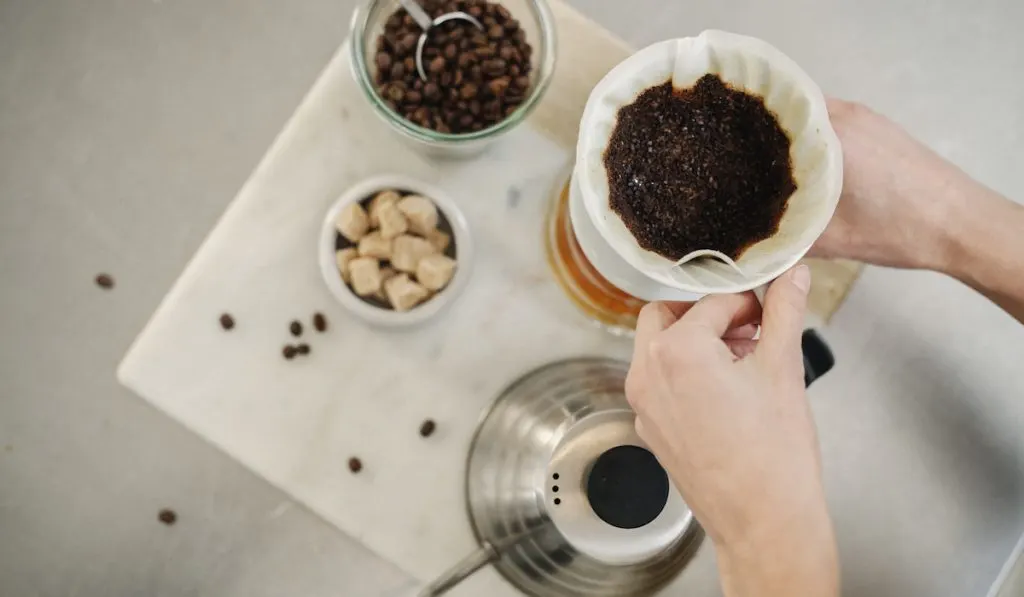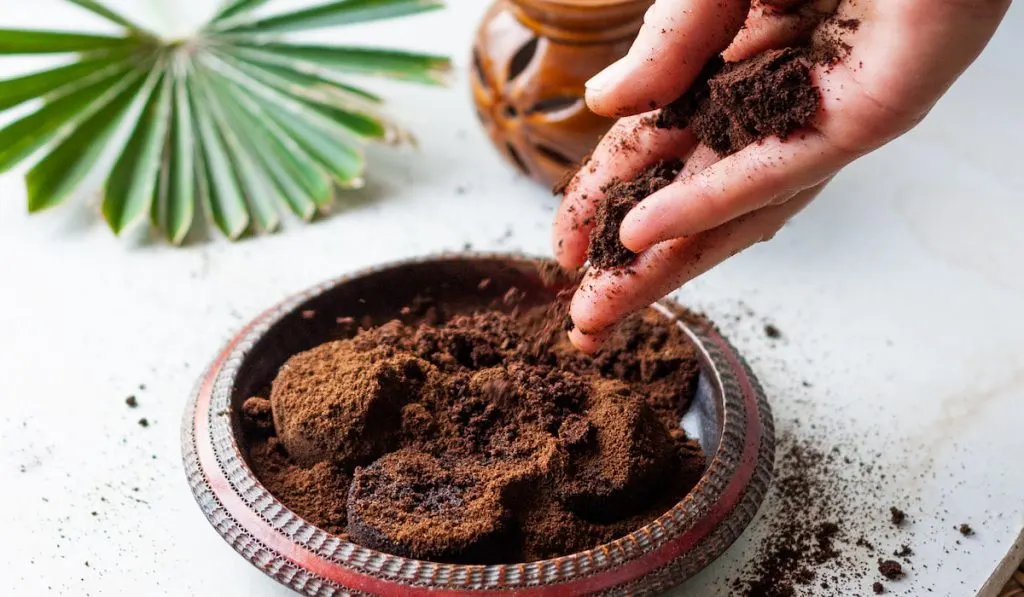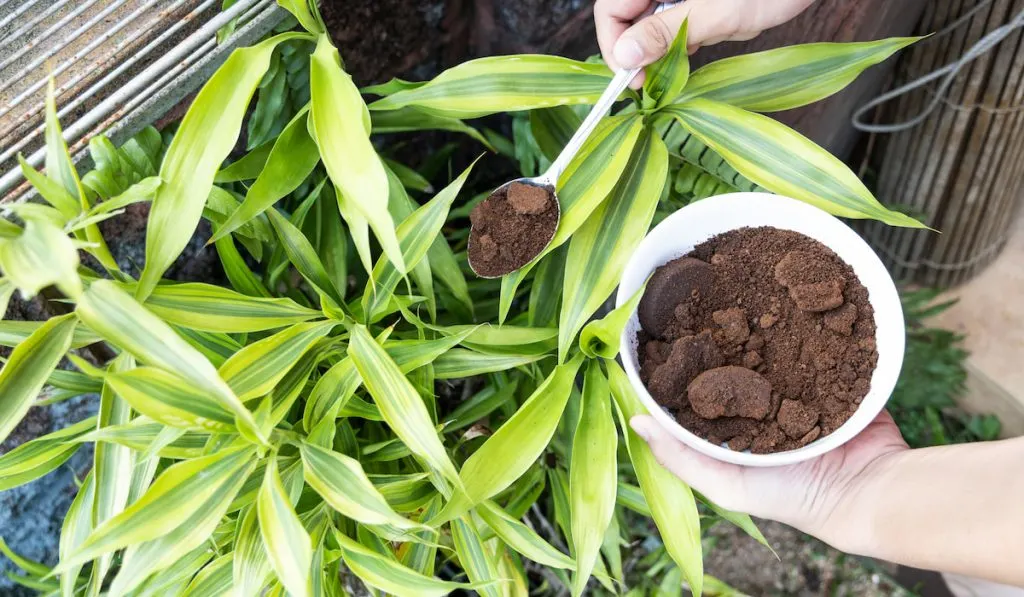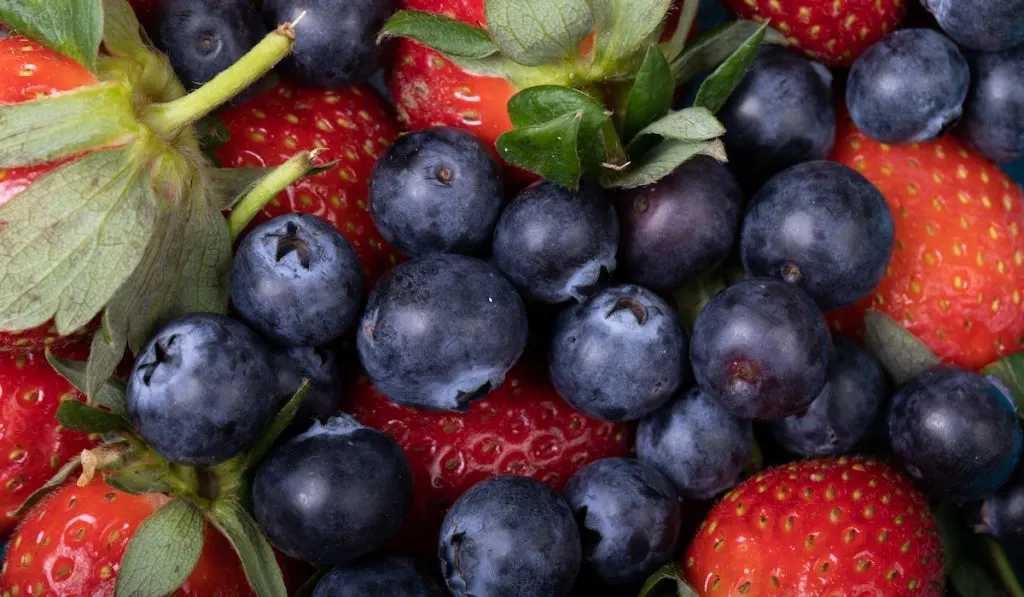After our morning coffee, we often pour the leftover coffee down the drain and feel wasteful having nothing else to do with the remaining coffee. But what if we can put the leftover coffee to good use instead?
This article will elaborate on ways we can put our leftover coffee, stale coffee, and spent grounds to good use in tomato production.
Can You Pour Coffee on Tomato Plants?
Coffee is good for your tomato plants. When you have had your coffee and are left with some cold stale coffee, pour it into a bigger jug and dilute with water to concentrations less than 25%. Then you can use it to water your tomato plants.

However, care should be taken not to pour coffee too close to the roots as this may lead to over-concentration which may harm the plants. Therefore, water at least 5 inches away from the plant stem.
This will boost the plants by increasing the acid level in the soil and the nutrients in the soil. Since tomatoes are acid-loving plants, it will improve the quality of the fruits and increase the yields.
Do tomatoes like coffee?
Tomato plants do very well in soils that are slightly acidic and rich in nitrogen. Nitrogen is utilized by the plants during their vegetative growth stage and this can be offered by coffee, which is known to contain significant amounts of nitrogen.
As tomato plants start to bear fruits, potassium and phosphorus are vital for the production of large fruits and quality fruits.
Coffee contains both potassium and phosphorus so your tomato plants should respond well to it since they are considered to be acid-loving plants.

What are coffee grounds?
Coffee grounds are the dregs you are left with after brewing your coffee. Most of the time, they just get thrown away. They are organic and compostable. Coffee grounds can also be used in the garden as a natural fertilizer, especially for your tomatoes.
Coffee grounds attract earthworms, which speed up the rate of decomposition of organic material and produce compounds that repel both slugs and insect pests.
With coffee being slightly acidic, the acidity in the coffee grounds will lower the pH of the soil, making them ideal for acid-loving plants.
You can add coffee grounds to other compost materials and allow them to decompose and slowly release nutrients into the soil. Keep coffee grounds to less than a quarter of the material included in your compost because coffee grounds compact easily preventing water filtration and air circulation.
This can be avoided by spreading used coffee grounds around your tomato plants in two-inch layers topped with at least 3 inches of organic mulch. Coffee grounds are considered green material and must be balanced with other organic materials, such as dried leaves, to compost properly.
Coffee grounds contain a significant amount of key nutrients which include; nitrogen, potassium, iron, calcium, chromium, magnesium, and phosphorus. Plants depend on these essential elements for their growth and development.
As plants germinate and grow, they absorb nutrient elements from the soil, causing its depletion. To recycle these nutrient elements back to the soil, other sources are necessary. Coffee grounds are one of the best alternatives for enriching nutrient-depleted soils and restoring their nutritional status.

Advantages of Using Coffee Grounds
Sparingly sprinkling coffee grounds around plants serves as good nourishment for your vegetables. Coffee grounds enrich the soil by adding organic matter which helps in improving drainage, water retention, and soil aeration.
However, since coffee grounds release nutrients slowly to the ground, it is good to look for faster options when the nutrients are urgently needed.
Here are some other advantages of using coffee grounds in the garden:
- Coffee grounds as a pesticide
Coffee grounds are known to contain compounds that are toxic to insect pests and slugs. These are diterpenes and caffeine. For this, coffee grounds are effective as pesticides in two main ways.
To effectively use them in your garden, scatter coffee grounds on the soil or you can place them in a bowl and set it in the garden to act as a deterrent.
2. Coffee grounds as a mulch
Coffee grounds make an excellent mulch for plants but this should only be done after germination as nitrogen is a germination inhibitor and may suppress plant growth causing stunted plants. This is why coffee grounds should always be mixed with other organic material when it is intended to be used as mulch.
Also, coffee grounds particles are prone to compaction which inhibits water penetration into the soil layers. This leads to water insufficiency and in extreme conditions, plants may wilt and die.
Sprinkle coffee grounds on the topsoil layer to avoid compaction when dried and cover with a layer of other organic material to prevent compaction and nutrient locking.

Other vegetables that like coffee
Other than tomatoes, other vegetables and fruits that like coffee include:
Spider plant
Spider plant is one of the most sought-after houseplants that do well in delicate acidic soils. It’s a light-loving plant and does very well in soils rich in nitrogen with a Ph of 6.1-6.5 and soils that are well-drained.
For these reasons, the spider plant loves coffee for it promotes optimum soil conditions.
Carrots
Carrots and radishes are root tubers that flourish well in soils that are well-drained and rich in nutrients. To have the best tubers, in both yield and size, mix coffee grounds with the soil when planting.
Berries
Both blueberries and strawberries are plants that require a lot of nitrogen for their growth and development.
This can be achieved by incorporating coffee grounds into the soil to slowly release the nutrients together with other organic materials.
Peppers
Peppers are acid-loving plants and are naturally well established in soils rich in nitrogen. This can be offered by coffee grounds and that is why peppers are known to like coffee grounds.
However, too much nitrogen leads to excessive vegetative growth at the expense of the fruits and that is why you should avoid incorporating too much coffee ground into the soil when growing peppers.
Conclusion
Coffee is a good source of nitrogen which is much needed especially by vegetables for growth. Although the use of coffee has not been well adopted by many in replenishing the soil with nutrients, it is a reliable and slow means of restoring soil nutritional status after depletion by plants.
However, care should be taken not to use excess coffee as this can cause harm to the plant. It is also important to note that coffee grounds are a slow releaser of nutrients and therefore are not advisable to use when immediate results are desired.
When using stale coffee, dilution of coffee to low concentrations allows for more frequent use of coffee to water your plants in the garden. This will boost the production of higher quality tomatoes and other vegetables.
There is also a need to monitor the pH changes directly applying coffee grounds may cause. For this, you should learn to keep the pH below toxic levels.
Resources
- https://alifeinthewild.com/peppers-love-coffee-grounds
- https://farmingmethod.com/list-of-plants-that-like-coffee-grounds
- https://gardenine.com/plants-that-like-coffee-grounds
- https://www.tomatobible.com/coffee-grounds-tomato-plants
- http://growingtomatoes.website/2020/01/23/stale-morning-coffee-your-tomato-plant-will-love-you-for-i
